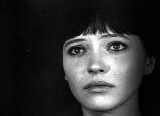
, screenwriter
and film critic
. He is often identified with the 1960s French film movement, French Nouvelle Vague, or "New Wave
".
Like his New Wave contemporaries, Godard criticized mainstream French cinema's "Tradition of Quality", which "emphasized craft over innovation, privileged established directors over new directors, and preferred the great works of the past to experimentation." To challenge this tradition, he and like-minded critics started to make their own films. Many of Godard's films challenge the conventions of traditional Hollywood
in addition to French cinema.
Art attracts us only by what it reveals of our most secret self.![]()
The truth is that there is no terror untempered by some great moral idea.![]()
Beauty is composed of an eternal, invariable element whose quantity is extremely difficult to determine, and a relative element which might be, either by turns or all at once, period, fashion, moral, passion. ![]()
All you need for a movie is a gun and a girl.![]()
To me style is just the outside of content, and content the inside of style, like the outside and the inside of the human body—both go together, they can’t be separated.![]()
The cinema is not an art which films life: the cinema is something between art and life. Unlike painting and literature, the cinema both gives to life and takes from it, and I try to render this concept in my films. Literature and painting both exist as art from the very start; the cinema doesn’t.![]()
Photography is truth. The cinema is truth twenty-four times per second. ![]()
"I would never see a good movie for the first time on television."![]()
"...the movie is not a thing which is taken by the camera; the movie is the reality of the movie moving from reality to the camera."![]()
"In films, we are trained by the American way of moviemaking to think we must understand and 'get' everything right away. But this is not possible. When you eat a potato, you don't understand each atom of the potato!"![]()

